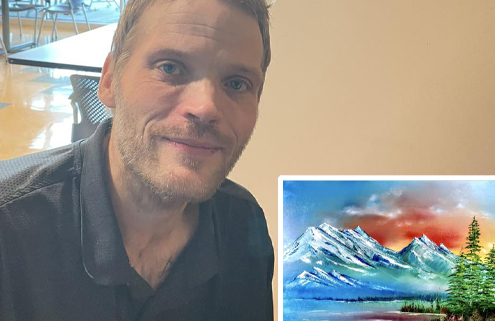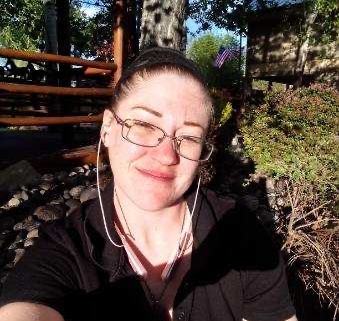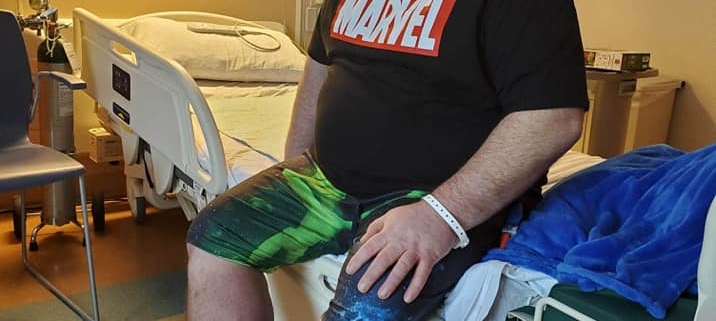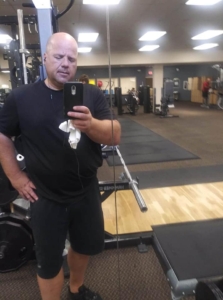John Gillette experienced a large trauma to his abdomen, which required multiple surgeries, drains, wound care, and medical interventions. At one point, John was intubated and placed on the ventilator, a machine to help him breathe…
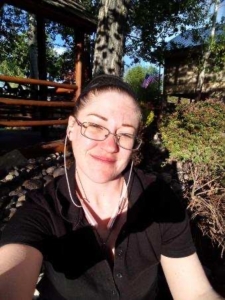
After suffering serious injuries in a car accident, Mariah Buckman came to ACHM for wound care and healing.
Mariah Buckman’s car accident changed her life. While driving one day, Mariah overcorrected and was ejected from her vehicle. A healthy 29-year-old at the time of the accident, Mariah suffered serious injuries. These included a splenic laceration, fractures of her wrist, face, and spine, and a degloving injury to her left leg. “It was just so weird,” Mariah reflected. “I just remember looking down at my wrist and seeing my arm broken in so many places.”
Initially, Mariah admitted to Bozeman Health Deaconess Hospital. She then transferred to St. Vincent in Billings. Mariah required complete removal of her spleen and multiple surgeries to fix all her broken bones. She also had to undergo multiple leg surgeries and a skin graft.
The damage to Mariah’s leg was significant. “When I was laying in the field, they told me that I needed to have a tourniquet placed because I was losing too much blood. The EMT told me that it was going to hurt when he put it on me. But I don’t remember ever feeling him put it on. I was just in so much shock.”
Mariah was uncertain how she could return home with her wounds and manage the broken bones that prevented her from walking. An unstable pelvis fracture required her to be on bed rest for many weeks. Hope came in the form of a liaison from Advanced Care Hospital of Montana. The liaison visited Mariah at St. Vincent and conveyed she could transfer to ACHM for wound care and to begin her healing process. Mariah cried tears of joy at the news. “I am just so happy that I got accepted as a patient,” she said.
Mariah discharged from ACHM after some initial recovery and wound care teaching. “I just want everyone to know how thankful I am to have been here,” she shared. We at ACHM are also thankful Mariah was able to receive the world-class care that we give at ACHM!
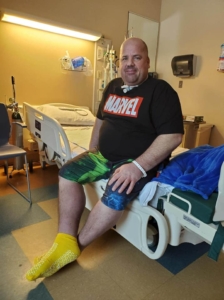
Complications from Cowden syndrome led Michael Kuckkhan to Advanced Care Hospital of Montana where he found support both medically and emotionally.
Michael Kuckkahn lives with a condition known as Cowden syndrome. The condition causes a person to develop non-cancerous growths throughout the body. These most often occur in the mouth and intestines.
As a result of the ulcers in his mouth, Michael struggled to eat or drink anything. He had undergone multiple abdominal surgeries and lived with pain each day. Then, he sustained right-sided heart failure, which resulted in respiratory failure. Requiring a ventilator to breathe, Michael had a tracheostomy tube placed. He also needed a PEG tube for nutrition.
Cowden syndrome had Michael fighting for his life.
Michael’s doctors at Benefis Hospital in Great Falls, MT recognized he may never liberate from the ventilator. They recommended a transfer to Advanced Care Hospital of Montana. ACHM offers a respiratory failure program certified by The Joint Commission. The program is regarded as the leader in ventilator weaning. Michael and his family agreed that ACHM offered him the best possible outcome. Once medically stable, Michael transferred via air flight to ACHM.
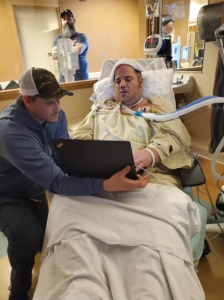
ACHM’s certified respiratory failure program offered Michael the best chance at weaning off a ventilator and regaining his independence.
Upon arrival at ACHM, the clinical staff determined Michael’s new baseline. The recovery process began immediately. Driven by love for his two young children, Michael made an incredible recovery.
“I just want to do more for my two-year-old and three-year-old,” Michael said.
The support of Michael’s mother, father, three brothers, and a sister played a key role in his recovery. One of his first memories after waking from a coma was his mother encouraging him. “She told me to get up, fight, and show them what I can do.”
Michael has a lot of fight in him, and a lot of fight ahead of him.
“When I woke, my wife left me,” Michael shared. On top of fighting for his life, Michael now faced a battle for custody of his children.
Michael found support–medically and emotionally–in the staff at ACHM. “The staff there has changed my life for the better,” he said. “They have helped encourage me and helped me with kind words. They prayed for me and watched over me.” He hopes to inspire others with his story.
“My ultimate goal is to help others get back up again and help them realize what they can do. I did it and so can they. I want to show people how weak I am, how strong God is in me, and the amazing people around me. It’s what I want my kids to learn, and anyone who I run into. Everything is possible with hope, belief, and determination.”
One person Michael wanted to specifically recognize was Holly Adams. “She’s been someone ACHM can be very proud of. She has helped me so very much! There are no better than Holly and her staff. They have been my heroes!”
Tracy Brophy is an independent 45-year-old woman, who worked at a local truck stop. When she was involved in a motor vehicle accident, Tracy’s life changed in an instant. Turning her vehicle around on the interstate, another vehicle struck Tracy’s from behind at 50 miles per hour. She was wearing her seatbelt and had to be extracted from her vehicle. Tracy initially complained of neck and back pain, for which she was placed in spinal precautions immediately. She did not lose consciousness.
Diagnostics revealed dislocation of Tracy’s C5 – C6, as well as T8 – T9 vertebral fractures, left rib fractures, a pneumothorax, and a splenic laceration. A CAT scan of Tracy’s head revealed no brain injury. Though she did not need surgery, Tracy did require a ventilator and eventually a tracheostomy.
When Tracy admitted to Advanced Care Hospital of Montana, she was off the ventilator, but still required oxygen. She could not tolerate a speaking valve to the tracheostomy, but could communicate by mouthing words and writing. A tube in her nose provided nutrition to Tracy’s stomach. She required maximum assistance for bed mobility. Therapy worked with Tracy on putting on and taking off her back brace, as well as increasing her mobility.
At the time of discharge, Tracy was at minimum assistance with bed mobility and contact guard assistance for sit-to-stand transfers. She could walk 275 feet with a front-wheeled walker. Tracy could tolerate the Nu-Step and other therapeutic exercises to improve her endurance and strength. Speech therapy assessed Tracy’s swallowing and was able to initiate oral intake six days after admission. Tracy’s tracheostomy was taken out and she could eat a regular diet with thin liquids.
Tracy discharged to an inpatient rehabilitation facility. There, she would receive a more focused, higher frequency of therapies to further advance her independence. Tracy’s ultimate goal is to be safe and independent in her own environment.
While at the time of writing, Tracy was not yet able to return to work, she is hopeful that will change after her next appointment. We wish Tracy the very best in her continued return to independence!
About Ernest Health
Advanced Care Hospital of Montana is part of Ernest Health, a network of rehabilitation and long-term acute care hospitals. Ernest Health hospitals see patients who are often recovering from disabilities caused by injuries or illnesses, or from chronic or complex medical conditions.Read More
Quick Reference Links
• Contact Us• Career Opportunities at this Hospital
• Price Transparency
• About Ernest Health

